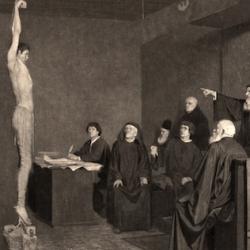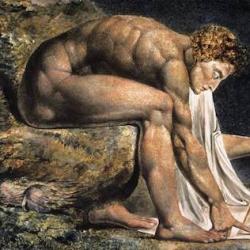Murphy goes into admiring detail describing Thomas’s theory of interior senses in higher animals. Apart from its purely historical interest and the anticipations of later scientific theories, Thomas’s discussion has philosophical and theological interest in its own right. He claims, for instance, that there are a number of interior senses (ST, I, 78, 4):
“for the reception of sensible forms, the ‘proper sense’ and the ‘common sense’ are appointed, and of their distinction we shall speak farther on (ad 1,2). But for the retention and preservation of these forms, the ‘phantasy’ or ‘imagination’ is appointed; which are the same, for phantasy or imagination is as it were a storehouse of forms received through the senses. Furthermore, for the apprehension of intentions which are not received through the senses, the ‘estimative’ power is appointed: and for the preservation thereof, the ‘memorative’ power, which is a storehouse of such-like intentions.”
These senses are shared by animals and human beings. Animals have memory: “A sign of which we have in the fact that the principle of memory in animals is found in some such intention, for instance, that something is harmful or otherwise. And the very formality of the past, which memory observes, is to be reckoned among these intentions.”
Further, animals have what Thomas calls “imagination,” the capacity to retain sense impressions, and not merely to receive them: “Now we must observe that for the life of a perfect animal, the animal should apprehend a thing not only at the actual time of sensation, but also when it is absent. Otherwise, since animal motion and action follow apprehension, an animal would not be moved to seek something absent: the contrary of which we may observe specially in perfect animals, which are moved by progression, for they are moved towards something apprehended and absent. Therefore an animal through the sensitive soul must not only receive the species of sensible things, when it is actually affected by them, but it must also retain and preserve them.”
Animals even possess some power of judgment by which they distinguish whether objects of perception are good or bad, hurtful or helpful. The dog doesn’t merely perceive a bone, but judges the bone to be a tasty food item: “Again we must observe that if an animal were moved by pleasing and disagreeable things only as affecting the sense, there would be no need to suppose that an animal has a power besides the apprehension of those forms which the senses perceive, and in which the animal takes pleasure, or from which it shrinks with horror. But the animal needs to seek or to avoid certain things, not only because they are pleasing or otherwise to the senses, but also on account of other advantages and uses, or disadvantages: just as the sheep runs away when it sees a wolf, not on account of its color or shape, but as a natural enemy: and again a bird gathers together straws, not because they are pleasant to the sense, but because they are useful for building its nest. Animals, therefore, need to perceive such intentions, which the exterior sense does not perceive.”
Thomas recognizes a distinction between human and animal imagination and judgment: Now, we must observe that as to sensible forms there is no difference between man and other animals; for they are similarly immuted by the extrinsic sensible. But there is a difference as to the above intentions: for other animals perceive these intentions only by some natural instinct, while man perceives them by means of coalition of ideas. Therefore the power by which in other animals is called the natural estimative, in man is called the ‘cogitative,’ which by some sort of collation discovers these intentions.” But the intriguing thing is that he recognizes such capacities in animals.















